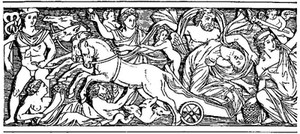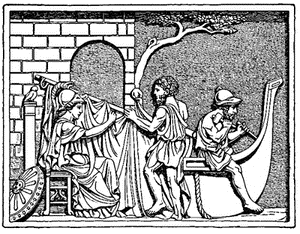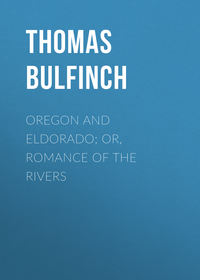 полная версия
полная версияThe Classic Myths in English Literature and in Art (2nd ed.) (1911)
4
On the Titans, etc., Preller's Griech. Mythol. 1, 37.
5
On signification of Uranus, Cronus, Zeus, see Preller, 1, 37, 38, and Commentary, §§ 4, 24.
6
Roscher, Ausf. Lex., Article Giganten [J. Ilberg].
7
The name more probably signifies Brandisher [of the Lance].
8
Consequently the creation of these men could not be assigned to Prometheus, – unless they were made by him before the war of the Titans.
9
There is uncertainty as to the mythical period of these events. The order here given seems to me well grounded. Hes. Works and Days, 180; Theog. 790-910.
10
§§ 156, 161, 191 and Commentary, § 10.
11
From Herakles, a drama by George Cabot Lodge.
12
From Byron's Prometheus. See also his translation from the Prometheus Vinctus of Æschylus, and his Ode to Napoleon Buonaparte.
13
Prometheus, or The Poet's Forethought. See Commentary.
14
Compare Byron's political satire, The Age of Bronze.
15
Oracles, see §§ 24, 30, and Commentary.
16
Consult, in general, corresponding sections of the Commentary.
17
Symbolized on earth by Mount Olympus in Thessaly.
18
Cowper's translation.
19
See Commentary, § 23, for Gladstone's latest utterance on the number of the Olympians.
20
The names included in parentheses represent the Greek, the others being Roman equivalents, Latin names, or names common to both Greek and Roman usage.
21
See Commentary, § 34.
22
On the Latin name, see Commentary, § 24.
23
Iliad, I, 622-625, Earl of Derby's translation. See also the passage in Chapman's translation.
24
On the name Juno, see Commentary.
25
For the names Athene and Minerva, see Commentary.
26
See Commentary.
27
Iliad, 5, 590. See also 21, 395.
28
Iliad, 18, 395.
29
Iliad, 1, 390.
30
On the birth of Apollo, his adventures, names, festivals, oracles, and his place in literature and art, see Commentary. For other particulars, see sections on Myths of Apollo.
31
From Cynthia's Revels.
32
Iliad, 5, 370, etc.
33
A popular etymology.
34
For Venus in poetry and art, see Commentary.
35
From the Venus of Milo, by E. R. Sill, formerly professor of English Literature in the University of California.
36
The references are to the Berkeley Hills, the Bay of San Francisco, and the glimpses of the Pacific.
37
Lang, Odyssey, 24, 1; adapted.
38
Eros, by Edmund Gosse. For verses on the blindness of Cupid, see Lyly's Cupid and Campaspe in Commentary.
39
For description of their spinning, see translation of Catullus, LXIV, in § 191.
40
See Commentary.
41
For references to poetry and works of art, see corresponding sections in Commentary.
42
According to Thomas Moore's Song of a Hyperborean.
43
From Alexander's Feast.
44
For interpretation and illustration, see corresponding sections of Commentary.
45
Iliad, 22, 482; 9, 568; 20, 61.
46
Odyssey, 10, 508; 11, 20; 24, 1.
47
Sophocles, Œdipus Rex, 177.
48
Æneid, 6, 295.
49
From The Garden of Proserpine, by A. C. Swinburne.
50
Æneid, 6.
51
Odyssey, 4, 561.
52
Hes. Works and Days, 169.
53
From The Fortunate Islands, by Andrew Lang.
54
Iliad, 14, 231; 16, 672.
55
Odyssey, 24, 12; 19, 560. Æneid, 6, 893. Ovid, Metam. 11, 592.
56
For genealogical table, see Commentary.
57
For references to poetry and works of art, see corresponding sections of Commentary.
58
Iliad, 14, 303.
59
Iliad, 18, 30-50.
60
For genealogical table, see Commentary.
61
Wordsworth, Miscellaneous Sonnets.
62
Names of the corresponding Greek divinities are in parentheses.
63
For illustrative material, see Commentary.
64
Gellius, 5, 12. Ovid, Fasti, 1, 179. Macrobius, Sat. 1, 9-15.
65
From Macaulay's Prophecy of Capys.
66
Ovid, Metam. I, 700 et seq.
67
Ovid, Metam. 2, 410 et seq.
68
Translated by Andrew Lang: Theocritus, Bion, and Moschus, London, 1880.
69
§ 70.
70
Ovid, Metam. 3, 260 et seq.
71
§§ 42, 110-113.
72
From E. R. Sill's Semele.
73
Commentary, §§ 118, 255.
74
Ovid, Metam. 7, 172 et seq.
75
Roscher, Ausf. Lex. Lfg. 3, 379 [Schirmer]. Originals in Pausanias, Apollodorus, and Hyginus.
76
From Tennyson's Amphion. See Horace, Ars Poet. 394.
77
Ovid, Metam. 8, 620-724.
78
From The Sons of Cydippe, by Edmund Gosse in his On Viol and Flute.
79
§ 27, and Commentary.
80
From Ovid.
81
From Spenser's Muiopotmos.
82
Ovid, Metam. 6, 1-145.
83
§ 200.
84
Iliad, 5, 850 et seq. (Lang, Leaf, and Myers' translation). In accordance with the system of nomenclature adopted in this work, Latin equivalents are given, wherever possible, for Greek names.
85
Iliad, 21, 390 (Lang, Leaf, and Myers' translation).
86
Ovid, Metam. 3, 1-137; 4, 563-614.
87
Iliad, 2, 1335.
88
Ovid, Metam. 6, 313-381.
89
§ 30.
90
Roscher, Ausf. Lex. Lfg. 2, 254, Article Aloadæ [Schultz].
91
Ovid, Metam. 10, 162-219.
92
Ovid, Metam. 2, 1-400.
93
§ 44.
94
Medio tutissimus ibis.– Ovid.
95
Hic situs est Phaëthon, currus auriga paterni,Quem si non tenuit, magnis tamen excidit ausis.– Ovid.96
Iliad, 1, 43-52 (Lang, Leaf, and Myers' translation).
97
Ovid, Metam. 6, 165-312.
98
From W. S. Landor's Niobe.
99
See Commentary, §§ 64, 80.
100
Iliad, 18, 564 (Lang, Leaf, and Myers' translation).
101
Cicero, Natura Deorum, 3, 22.
102
See Commentary.
103
From Browning's Balaustion's Adventure. The Greek form of the proper names has been retained.
104
Proserpine.
105
For the originals, see Iliad, 2, 715, and the Alcestis of Euripides.
106
Ovid, Metam. 11, 146-193.
107
§ 118.
108
§ 145.
109
Ovid, Metam. 1, 452-567.
110
From the Fable for Critics.
111
Iliad, 9, 561; Apollodorus, 1, 7, § 8.
112
Stephen Phillips, Marpessa.
113
Ovid, Metam. 4, 256-270.
114
§ 196.
115
§ 168.
116
Ovid, Metam. 5, 585-641.
117
Ovid, Metam. 3, 138-252.
118
Apollodorus, 1, 4, § 3.
119
Ovid, Fasti, 5, 537; Iliad, 18, 486, and 22, 29; Odyssey, 5, 121, 274.
120
The story is told by Hyginus in his Fables, and in his Poetical Astronomy.
121
Authorities are Pausanias, 5, 1, §§ 2-4; Ovid, Ars. Am. 3, 83; Tristia, 2, 299; Apollonius, and Apollodorus.
122
From the Endymion, Bk. 3.
123
§ 194.
124
Ovid, Metam. 10, 503-559, 708-739.
125
From an elegy intended to be sung at one of the spring celebrations in memory of Adonis. Translated from Bion by Andrew Lang. Cypris, Cytherea, and the Paphian refer to Venus. See Commentary. This elegy is also translated by Mrs. Browning and by Sir Edwin Arnold.
126
Apuleius, Metam. Golden Ass, 4, 28, etc.
127
William Morris, The Story of Cupid and Psyche, in The Earthly Paradise.
128
Robert Bridges, Eros and Psyche.
129
The last three paragraphs are from Pater's version in Marius the Epicurean.
130
William Morris, The Earthly Paradise.
131
By T. K. Hervey.
132
Ovid, Metam. 10, 560-680.
133
From W. S. Landor's Hippomenes and Atalanta.
134
The poetical passages are from Marlowe's Hero and Leander, First Sestiad. Marlowe's narrative was completed by Chapman. See Musæus of Alexandria, De Amore Herois et Leandri; Virg. Georg. 3, 258; Ovid, Her. 18, 19; Stat. Theb. 6, 770.
135
Sonnet, On a Picture of Leander.
136
Ovid, Metam. 10, 243-297.
137
Andrew Lang, The New Pygmalion.
138
From William Morris, Pygmalion and the Image, in The Earthly Paradise.
139
Andrew Lang, The New Pygmalion, or The Statue's Choice. A witty and not unpoetic bit of burlesque.
140
Ovid, Metam. 4, 55-166.
141
§ 100, and Commentary.
142
Murray, Manual of Mythology, p. 87; Ovid, Metam. 10, 298-502.
143
See Index for sections.
144
Hymn to Mercury (Hermes).
145
§ 60.
146
Ovid, Metam. 3, 511-733.
147
Longfellow, Drinking Song.
148
From The Praise of Dionysus.
149
Ovid, Metam. 11, 85-145.
150
See § 85.

Fig. 88. Rape of Proserpina
151
Ovid, Metam. 5, 341-347.
152
Song of Proserpine, while gathering flowers on the plain of Enna.
153
Ovid, Metam. 5. 440, 642; Apollodorus, 1, 5, § 2; Hyginus, Fab. 147.
154
From Proserpine, stanzas written by Lake Pergusa; by George E. Woodberry (Century Magazine, July, 1909).
155
Ovid, Metam. 10, 1-77.
156
See Commentary
157
From W. S. Landor's Orpheus and Eurydice in Dry Sticks.
158
See Index.
159
§ 154.
160
Iliad, 5, 649; Apollodorus, 3, 12, § 7.
161
See Index.
162
Hyginus, Fab. 84, 253; Pindar, Olymp. 1, 114.
163
Ovid, Metam. 7, 394 et seq.
164
Ovid, Metam. 11, 583-748.
165
Homeric Hymn to Venus; Horace, Odes, 1, 22; 2, 16; Apollodorus, 3, 12, § 4.
166
Ovid, Metam. 13, 622, etc. Odyssey, 4, 188; 11, 522. Pindar, Pyth. 6, 30.
167
Pausanias, 1, 42, § 2.
168
Darwin, Botanic Garden.
169
His name is not derived from the Greek pān, all, but from the root pă, to feed, to pasture (i.e. the flocks and herds).
170
Milton, Hymn on the Nativity.
171
Translated by C. M. Gayley.
172
By Edmund Clarence Stedman.
173
From The Satyr, by Robert Buchanan.
174
Ovid, Metam. 3, 339-510.
175
Idyl VI (Lang's translation). For Moschus, see Commentary, § 298.
176
From The Naiad, by Robert Buchanan.
177
Ovid, Metam. 8, 738-884.
178
See note (Scholium) on the Argonautics of Apollonius, B 477. Keil's edition, p. 415, l. 32.
179
J. R. Lowell, Rhœcus. The student should read the whole poem.
180
Ovid, Metam. 14, 623-771.
181
Thomson, Seasons.
182
Cf. Cicero, Tusculan Disputations, 4. 33, 71; and Statius, Silvæ, 5. 3, 152.
183
Theocritus, Idyl VI. See Andrew Lang's translation.
184
Theocritus, Idyl XI (Lang's translation).
185
Ovid, Metam. 13, 750-867.
186
Ovid, Metam. 13, 898; 14, 74; Tibullus, 3, 4-89.
187
From Keats' Endymion.
188
§§ 50, 52, and Commentary.
189
See §§ 239, 250, Adventures of Ulysses and Æneas.
190
Apollodorus, 3, 15, § 8.
191
Ovid, Metam. 4, 432-542.
192
Cf. Odyssey, 4, 410; Ovid, Fasti, 1, 369; Virgil, Georgics, 4, 317.
193
Cf. § 147, Milton's Carpathian Wizard.
194
See Commentary.
195
Ovid, Metam. 9, 1-100.
196
§ 156.
197
See Commentary.
198
Milton, Comus, 859-889.
199
§ 21, and Commentary, § 57.
200
For references to genealogical tables, see Commentary, § 148.
201
Apollodorus, 2, 1, § 5, etc.; Pausanias; Ovid, Heroides, 14; Horace, Odes, 3; 11; 23.
202
Simonides of Ceos, also Apollodorus, Pausanias, and Hyginus (Fables).
203
Ovid, Metam. 4, 608-739; 5, 1-249.
204
For Gorgons and Grææ, see § 52.
205
William Morris, The Doom of King Acrisius, in The Earthly Paradise.
206
William Morris, The Doom of King Acrisius, in The Earthly Paradise.
207
From Shelley's lines On the Medusa of Leonardo Da Vinci in the Florentine Gallery.
208
Milton, Il Penseroso, l. 19.
209
From Charles Kingsley's Andromeda.
210
Milman, Samor.
211
Milton, Comus.
212
Iliad, 6, 155-202; Apollodorus, 1, 9, § 3; Horace, Odes, 4; 11; 26.
213
See Commentary, §§ 103, 155.
214
Authorities are Homer, – Iliad and Odyssey; Theocritus 24; 25, etc.; Apollodorus, 2, 4, § 7, etc.; Sophocles, Women of Trachis; Euripides, Hercules Furens; Ovid, Metam. 9, 102-272; Seneca, – Hercules Furens and Œtæus; Hyginus, etc.
215
§ 172.
216
Atlas and the heavens, § 153.
217
§ 180.
218
§ 160.
219
§ 173.
220
Theocritus. Idyl XIII (Lang's translation).
221
Theocritus, Idyl X, 41, and the Scholia; Virgil, Bucol. 5; 8; 10; and Comments.
222
See the story of Daphne.
223
Theocritus, Idyl X (Lang's translation).
224
Thyrsis.
225
§ 119.
226
§ 83.
227
§ 15.
228
Milton.
229
See § 220. According to Sophocles, Philoctetes' father Pœas applied the torch.
230
See the spirited poems, Deïaneira and Herakles, in the classical, but too little read, Epic of Hades, by Lewis Morris.
231
Schiller's Ideal and Life. Translated by S. G. Bulfinch, brother of Thomas Bulfinch.
232
From Fragment of Chorus of a "Dejaneira."

Fig. 130. The Building of the Argo
233
§ 144.
234
Apollodorus, 1, 9, § 1; Apollonius Rhodius, 1, 927.
235
Ovid, Metam. 6, 667; 7, 143. The Argonautica of Apollonius of Rhodes.
236
See § 120.
237
See Table G, Commentary, § 103.
238
Dyer, The Fleece.
239
William Morris, Life and Death of Jason.
240
Ovid, Metam. 7, 143-293.
241
Ovid, Metam. 7, 297-353.
242
§ 176.
243
Macbeth, IV, i. Consult.
244
Ovid, Metam. 8, 260-546.
245
§ 170.
246
§ 180.
247
Chapter XXI.
248
From Swinburne's Atalanta in Calydon.
249
From Swinburne's Atalanta in Calydon.
250
From Swinburne's Atalanta in Calydon.
251
From Swinburne's Atalanta in Calydon.
252
Hyginus, Fab. 184; Apollodorus, 2, 8; Pausanias, 2, 18; 4, 3, etc.; Aristotle, Poetics, 14, 9.
253
Apollonius Rhodius, 4, 1629 (Broome's translation). See also Apollodorus, 1; 9, 26.
254
Hyginus, Fab. 80; Ovid, Fasti, 100. Theocritus, Idyl XXII, gives a different version.
255
Macaulay, Lays of Ancient Rome, The Battle of Lake Regillus.
256
§ 143.
257
§ 177. Apollodorus, 3, 1, § 3; 15, § 8; Pausanias, 1, 27, § 9, etc.; Ovid, Metam. 7, 456.
258
Virgil, Æneid, 6, 14-36; Ovid, Metam. 8, 152-259; Hyginus, Fab. 40, 44.
259
Erasmus Darwin.
260
Ovid, Metam. 2, 555; Apollodorus, 3, 14, § 1; Pausanias; and Hyginus, Fab. 48.
261
Ovid, Metam. 2, 554; 6, 676; Homer, Iliad, 2, 547; Odyssey, 7, 81; Hyginus, Poet. Astr. 2, 13.
262
For Ruskin's interpretation, see Queen of the Air, § 38.
263
Hyginus, Fab. 45; Apollodorus, 3, 14, § 8; Ovid, Metam. 6, 412-676. See Commentary.
264
Ovid, Metam. 7, 350-424; Plutarch, Theseus.
265
§ 167.
266
Odyssey, 11, 321; Plutarch, Theseus; Catullus, LXIV.
267
Catullus, LXIV. From The Wedding of Peleus and Thetis. A Translation in Hexameters, by Charles Mills Gayley.
268
Catullus, LXIV (Charles Mills Gayley's translation).
269
Sophocles, Œdipus Rex, Œdipus Coloneus, Antigone; Euripides, Phœnissæ; Apollodorus, 3, 5, §§ 7, 8.
270
Sophocles, Œdipus, the King (E. H. Plumptre's translation).
271
Sophocles, Œdipus at Colonus, ll. 1600, etc. (E. H. Plumptre's translation).
272
Æschylus, Seven against Thebes; Euripides, Phœnissæ; Apollodorus, 3. 6 and 7; Hyginus, Fab. 69, 70; Pausanias, 8 and 9; Statius, Thebaid.
273
Sophocles, Antigone; Euripides, Suppliants.
274
Sophocles, Antigone, ll. 450-470 (E. H. Plumptre's translation).
275
Sophocles, Antigone, closing chorus.
276
Pausanias, 9, 9, §§ 2, 3; Herodotus, 5, 61; Apollodorus.


